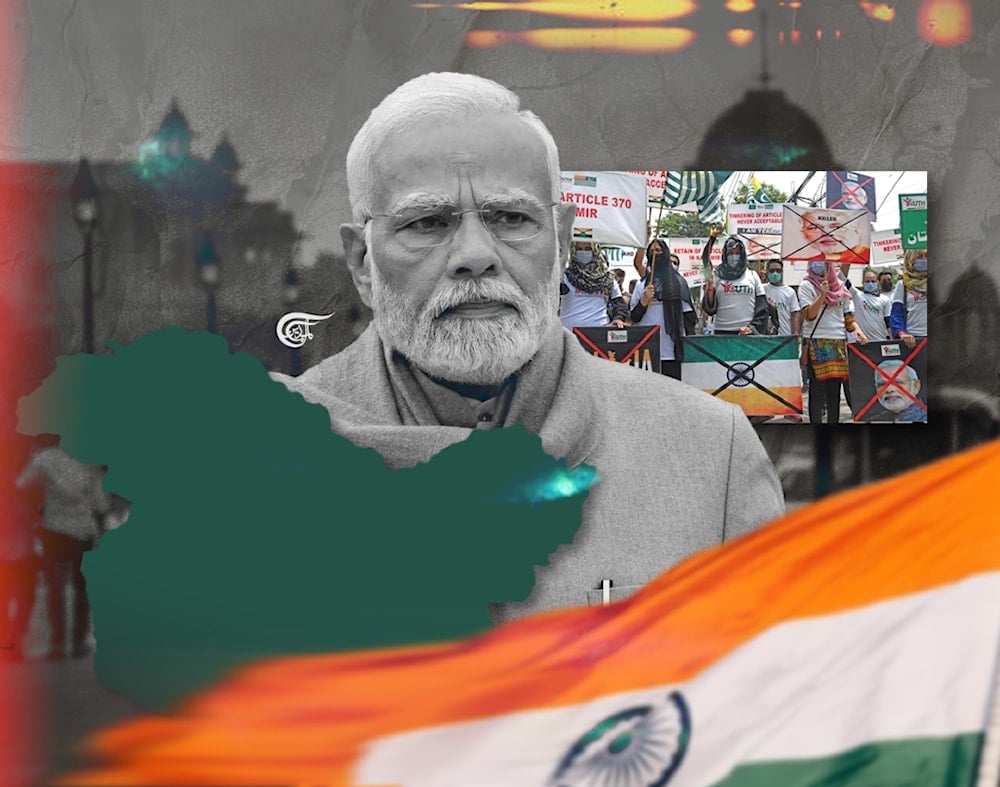Kashmiris disheartened, leaders ready for long battle post-special status verdict
Following the Indian Supreme court's decision, Kashmiris were greatly disappointed. Whereas once they had some autonomy, India is now working to regard Jammu and Kashmir as an Indian State, fueling popular discontent.
-

The verdict not only disappointed locals but also pro-India politicians in the region, who urged people to prepare for a prolonged battle to reclaim their "rights politically and peacefully." (Al Mayadeen English; Illustrated by Zeinab El-Hajj)
On December 11, 2023, people in Indian Kashmir anxiously awaited the Supreme Court's verdict on Article 370's abrogation.
Many expected a favourable outcome, arguing the government's action in 2019 was unconstitutional. However, the mood turned somber when Chief Justice of India, D.Y. Chandrachud, stated that Article 370 was a "temporary provision," and the region had "surrendered its autonomy."
Article 370 of the Indian constitution was enacted in 1949, and it granted the Indian side of Kashmir limited autonomy, but the court upheld the government's decision, claiming that the constitution of India can be applied to Jammu and Kashmir using "Article 370(1)(d) in one go."
"We do not find the use of Presidential power to issue CO-273 was mala fide. Thus we hold the exercise of Presidential Power to be valid," Chief Justice Chandrachud said. "The court cannot sit in appeal over the decision of the President of India on whether the special circumstances under Article 370 exist," he added.
The top court also directed the Government of India to restore the statehood of Jammu and Kashmir at the earliest, and directed the election commission of India to conduct polls in the region by September 30, 2024.
The local government had tightened security in the valley to maintain law and order and prevent untoward incidents.
Two former Chief Ministers of J&K, Ms. Mehbooba Mufti and Omar Abdullah, claimed they were placed "under house arrest" in separate X posts. However, J&K Police and Lt. Governor Manoj Sinha termed these statements as "allegations."
"The Supreme Court let everyone down," a local resident preferring anonymity told Al Mayadeen English. "There was a little ray of hope for justice, but it seems political influence is now considered," he added.
He pointed out past verdicts affirming that Article 370 cannot be revoked without the consent of the constituent assembly. "If those verdicts were considered, justice would have been served," he said. "It is clear that none care for Kashmiris, but for the land," he added.
The verdict not only disappointed locals but also pro-India politicians in the region. They urged people not to lose hope but to prepare for a prolonged battle to reclaim their "rights politically and peacefully."
"Disappointed but not disheartened," said former Chief Minister Omar Abdullah, mentioning that journalists were denied entry to his house for comments.
Mehbooba Mufti said that they will continue to struggle for Article 370's restoration. "The Supreme Court said Article 370 is temporary, leading to its revocation. This isn't our loss; it's the loss of the idea of India," she conveyed her message through a recorded video on various social media accounts.
Meanwhile the Prime Minister of India, Narendra Modi hailed the verdict of the Supreme Court.
"It was always my firm belief that what had happened in J&K was a great betrayal — of our nation and of the people living there. It was also my strong desire to do whatever I can to remove this blot, this injustice done to the people. I have always wanted to work to alleviate the suffering of the people of Jammu and Kashmir," Modi wrote in an article published by India Express. "In very basic words, Articles 370 and 35 (A) were major obstacles, and those suffering as a result were the poor and downtrodden. They ensured that the people of J&K never got the rights and development that the rest of their fellow Indians did," he said, adding that due to these articles, distance was created between people belonging to the same nation.
Expressing his happiness over the verdict, the Home Minister of India, Amit Shah, said that had he faced such a defeat (in SC), he would have gone into a depression and wouldn’t show up in Parliament for a month at least.
"Look at them (Opposition), they are doing a press conference to say that Article 370 was scrapped through wrong means," he said. "If you don’t mend your (Opposition) ways, you (seats) will reduce further in the next elections and Modi will come back to power for a third term," he added.
Senior separatist leader and Hurriyat Conference Chairman, Mirwaiz Umar Farooq, stated that the Supreme Court's decision on Article 370's abrogation was "unfortunate but not surprising."
"Those who supported J&K's accession during Partition and trusted promises made by Indian leaders must now feel deeply let down," Mirwaiz said. "The state, as it was in August 1947, stays divided along the ceasefire line, presenting an ongoing humanitarian and political challenge in need of resolution," he added.
Meanwhile, the valley remained calm post-verdict, with people seen moving around and businesses operating as usual.
Local politicians were approached for their comments. However, they refused to comment, saying that all of them will conduct a meeting and chalk out the modalities in order to carry on their fight for their right to have a special status, just like northeastern states in India.

 Sabha Khan
Sabha Khan
 5 Min Read
5 Min Read







